Inside the old school that’s now housing Utah’s homeless: Should more cities do the same?
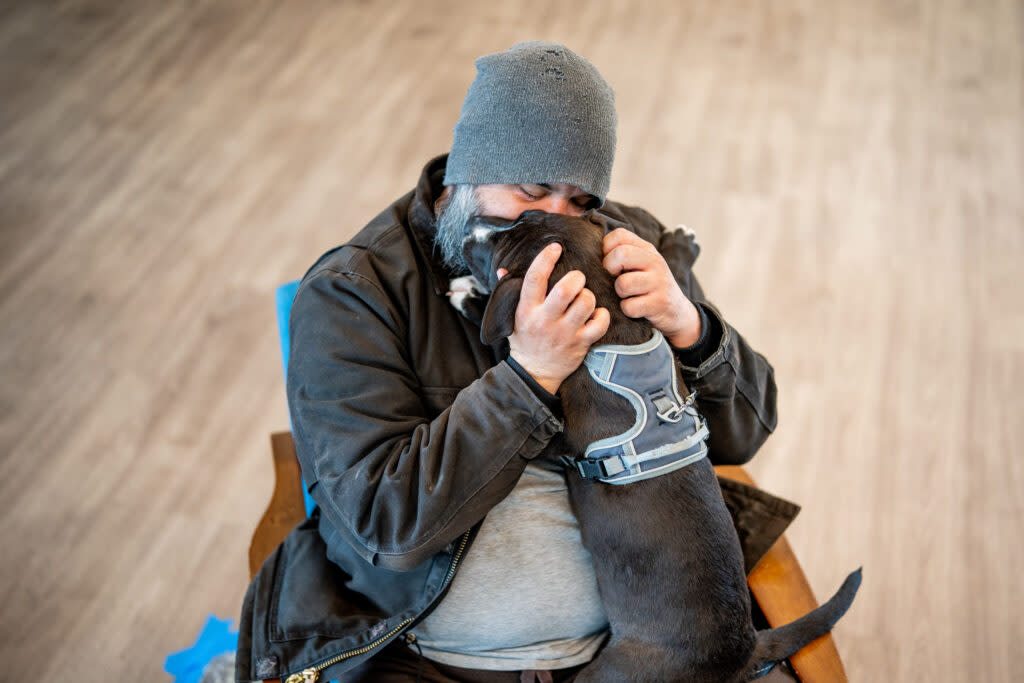
Austin Byrne, 39, gets some love from his dog Buddy while posing for a photo at Harris Housing, a permanent supportive housing facility that shares a campus with Switchpoint Tooele Community Resource Center in Tooele, on Friday, May 24, 2024. (Photo by Spenser Heaps for Utah News Dispatch)
Austin Byrne, 39, buried his face in the dark coat of his three-month old puppy named Buddy. The pup nuzzled against Byrne’s salt-and-pepper beard as the two sat in an armchair of a brightly-lit lobby of a new supportive housing complex in Tooele where Byrne has been living since late last year.
He moved in when the development opened its doors in December — ending his time living in a homeless shelter ever since he got out of jail. Byrne was arrested in 2022 when he got into an altercation while he was living in Wendover. The arrest cost him his job as a security guard at one of the casinos near the western edge of the Utah-Nevada border. He also lost his apartment, his car. When he got out of jail, all he owned were the clothes on his back.
“I lost everything,” he said. “I had to start over.”
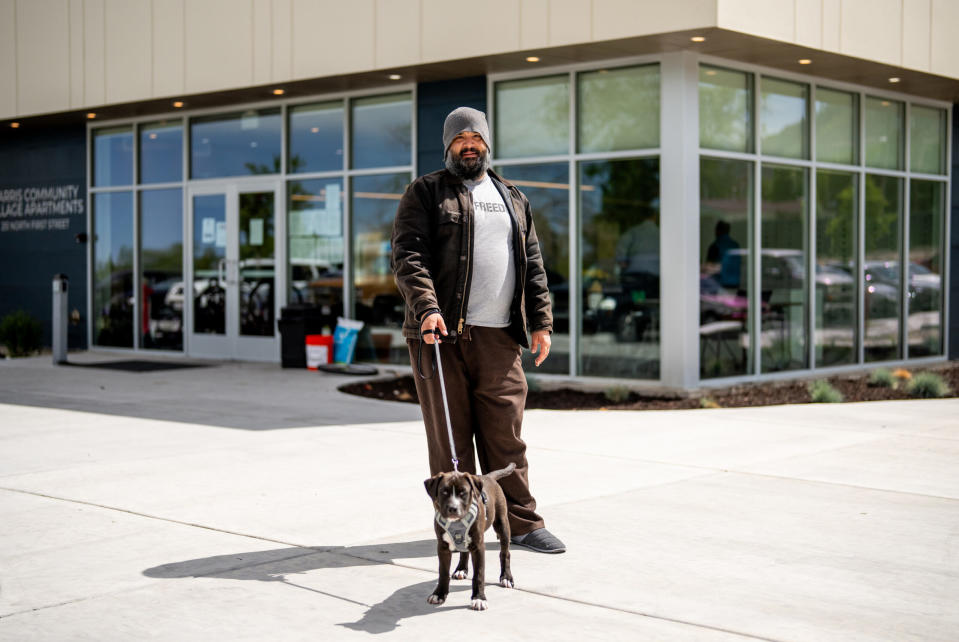
While living in a shelter on Vine Street — a temporary shelter in Tooele operated by the homeless provider Switchpoint while the permanent supportive housing complex where he lives now was being constructed — Byrne said he tried to save up to pay for his own housing by working in construction framing homes, but he didn’t make enough to afford rent, and definitely not enough for a home of his own.
Then, he said he began struggling with depression when his father died last year.
Byrne had dark circles under his eyes, which turned sad when he mentioned his dad. But when he looked down at the puppy leashed at his feet, his eyes softened.
“I’m doing a little bit better now,” Byrne said. “Now that I’ve got Buddy.”
Now, Byrne lives in one of the about 66 permanent supportive housing units at Harris Community Village. Many of the village’s residents have pets, Switchpoint staff said, something that’s allowed to help encourage a sense of community as well as provide companionship and responsibility to people struggling with loneliness or other difficulties. Along with Byrne, several other residents were walking their dogs in a fenced, grassy area that serves as a mini dog park.
“I really didn’t think about getting (a dog) until I came here and saw everybody else had one, seeing how happy they were,” Byrne said. “I was like, ‘Man, that looks like something I need.’ Otherwise, I was just hiding in my apartment.”
Byrne said caseworkers have been helping him manage his depression and turn his life around. For now, he said it’s taking it one day at a time, but he hopes to eventually get back on his feet.
“This place,” he said, “is a godsend.”
Harris Community Village
The apartment building near 251 N. 1st Street, owned by the Tooele County Housing Authority, sits next to a brick building that was once an elementary school.
Now, the school is a homeless shelter with 44 beds, including seven separate family rooms. In both facilities, Switchpoint provides resident support and case management services with an agreement with the housing authority.
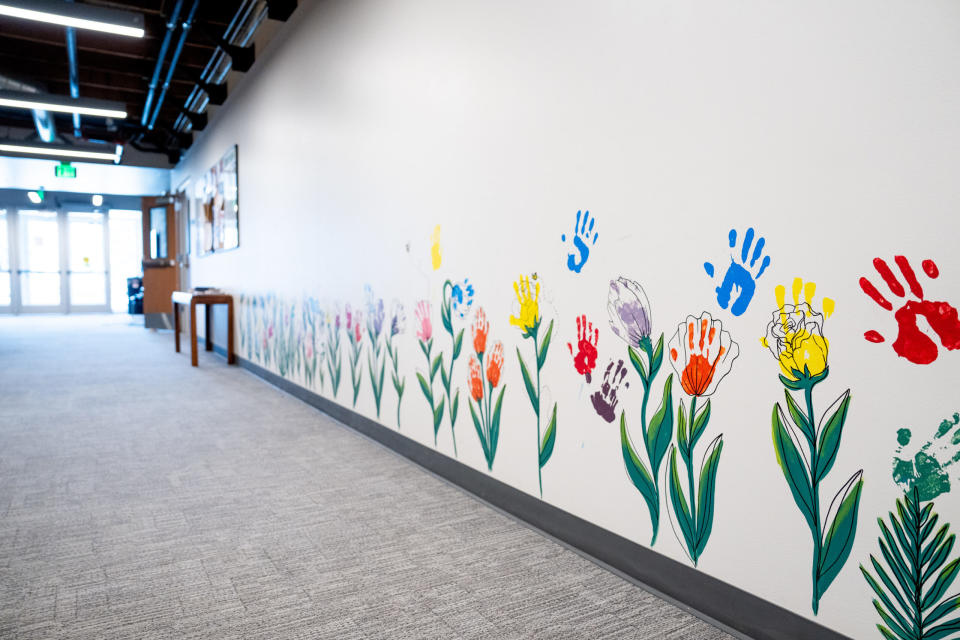
It’s been freshly renovated for its new role as a shelter, but its hallways — with walls that now feature rows of colorful flowers painted with the handprints of its new residents — still feel reminiscent of a school. As does its kitchen and cafeteria, which now serves some 500 meals a day (including about 300 for Meals on Wheels for people in need throughout the community).
Harris Community Village’s campus also features a 24/7 child care facility for families staying in the shelter and permanent supportive housing units, as well as community members living in the larger Tooele area.
It’s the first project of its kind in Utah — where a shelter, child care, case worker programs and supportive housing all share a campus. It’s also situated in a community not known for its homeless services (at least not yet).
Tooele is a small city located in what’s otherwise a mostly rural county of the same name, located some 35 miles west of Salt Lake City, where the vast majority of Utah’s homeless services are concentrated.
Even though Tooele is not usually frequented by Utah’s top elected officials, Utah Gov. Spencer Cox put it on the map when he held a ceremonial bill signing to celebrate a slate of homelessness and behavioral health bills passed by the Utah Legislature earlier this year.
He held the news conference in a plaza between Harris Community Village’s supportive housing complex and the homeless shelter to showcase its ingenuity — and told reporters the idea (renovating old elementary schools and placing shelter and housing all in one place) is one that should be replicated by other cities and counties across the state as Utah continues to grapple with its growing homeless population.
“I think this is a wonderful model,” the governor said at the time, “and one we’ll be talking to more counties about.”
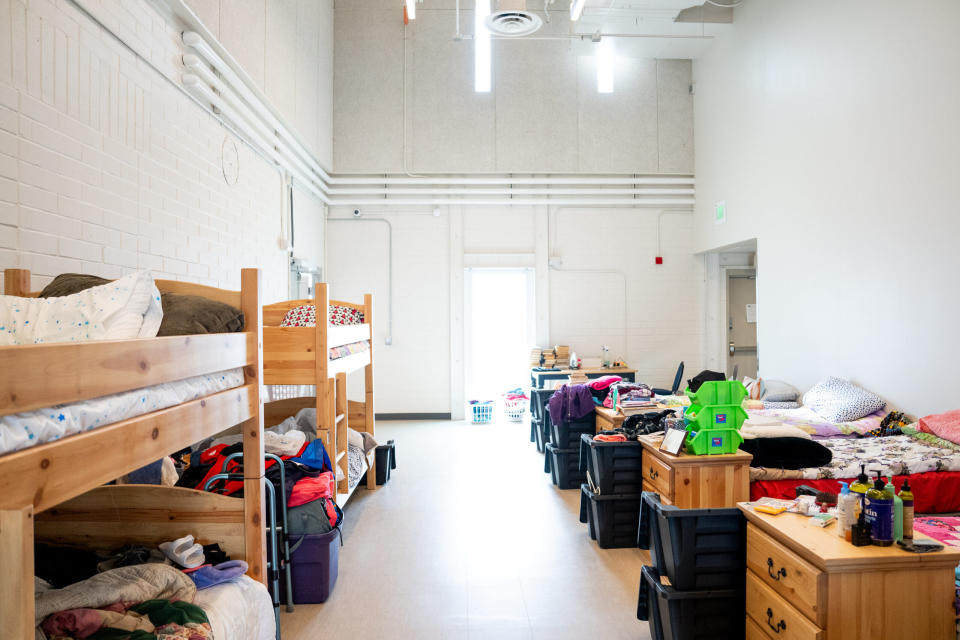
‘One miracle after another’
Harris Community Village only came to be because five years ago, one pastor — after multiple encounters with people experiencing homelessness with nowhere to go — began fretting that Tooele didn’t have many resources to help.
Rick Ehrheart, a now retired pastor from Mountain of Faith Lutheran Church in Tooele, nicknamed “Pastor Rick,” told Utah News Dispatch it all started in 2019.
GET THE MORNING HEADLINES DELIVERED TO YOUR INBOX
“Our little church here in Tooele. … we found someone living on our church patio, then someone had set up an encampment on our front yard, and probably the toughest one was one Saturday, another member and I were at the church doing some work and there was a young lady sleeping on the ground next to the church,” Ehrheart said. “We found out she had been thrown out of an abusive relationship. She had nowhere to go.”
“It just made it so apparent, the problem that Tooele had,” he added. “We had no place to refer to anybody who was homeless at the time. Literally no place.”
So Ehrheart said he started to get involved and ask questions. That year he attended a faith leaders luncheon at the Governor’s Mansion and started talking to people working in the governor’s office. Long story short, he was eventually introduced to people leading Switchpoint, which began its operations in southern Utah, based in St. George.
“I made the mistake of calling (Switchpoint executive director) Carol Hollowell,” he joked, and that started a chain reaction of meetings and effort that eventually brought the Harris Community Village to fruition. “It was kind of like one miracle after another that made it happen.”

The Tooele County Housing Authority ended up acquiring the former Harris Elementary School from a drug treatment center provider, which in 2019 successfully rezoned the school to be a drug rehab center.
“They took a lot of heat when the rezoning went through,” Ehrheart said. “But they got it through, so when we bought it … it had already been rezoned so we didn’t have to go through that again.”
It’s usually no easy feat to establish new homeless shelters. In 2017, after Salt Lake city and county officials worked for more than two years to site three new homeless resource centers, neighbors were up in arms. But in Tooele, there wasn’t nearly as much outcry. Perhaps that’s because the small-town facility flew under the radar, plus it had already been rezoned.
Since its opening, Harris Community Village also seems to mesh seamlessly with its surrounding community. Ehrheart said perhaps Tooele residents have been able to more easily accept it since it also came with permanent supportive housing, and both are operated by a provider that has firm rules when it comes to drug use.
The $31 million project was made possible using funds from the state, Tooele County, and The Church of Jesus Christ of Latter-day Saints, as well as other private donations, according to Switchpoint.
“If you can get permanent supportive housing along with the shelter, you’re doing a really good thing,” he said. “And I think that makes this such a special project.”

What is Switchpoint?
Switchpoint’s mission is in its name.
“A switch point is a mechanism on a train track that with a little bit of a turn sends the train in a completely different direction,” the provider states on its website. “Switchpoint offers tools to get life back on track for those who need it most.”
The provider’s staff take that motto to heart, looking for ways to be a “switch point” in someone’s life. While helping lead a recent tour of Harris Community Village for Utah News Dispatch, Jeff Quayle, Switchpoint real estate development director, said he thinks of it like this: While people go down the train track that is their life, sometimes they can reach a “switch point” — and they make a choice, where “one degree of difference” could mean a dramatic change in their trajectory.
“So what do you choose?” Quayle said. “We’re here to help you if you choose our route.”
Over the past decade or so, Switchpoint has expanded its operations rapidly throughout Utah and has become a sort of rising star within Utah’s homelessness network. Its origins trace back to 2013, when St. George was in search of solutions to its growing homeless population, and its shelter at the time was run down and struggling to provide “anything but a night by night band aid” to people experiencing homelessness, Switchpoint’s website states.
Executive director Hollowell, in an interview with Utah News Dispatch, said she was inspired to start Switchpoint in 2014 after she met a man in a wheelchair named Ray. He had been living on the streets of St. George for five years after he lost his wallet. After she helped him get a new ID and find stable housing, Hollowell said she “felt like I was called to do something.”
“I thought, ‘Wait a minute, if I could solve his problem, maybe I could help solve other problems,” she said. “And that really launched (Switchpoint) as, ‘How can we do something better and more?”
Hollowell wrote about her experience meeting Ray in a 2022 article for Profectus Magazine.
“Ray was my switch point,” she wrote. “I became his.”

Since Hollowell, who has a background in business development, opened Switchpoint Community Resource Center in St. George in 2014, its operations have expanded to now 17 different facilities, in and out of southern Utah, including child care and supportive housing.
That also includes several “micro-enterprises” to offer employment and volunteer opportunities to those experiencing homelessness as well as provide services to the community, from food pantries and thrift stores to doggie day care and more.
In 2020, Switchpoint expanded its operations to Salt Lake City and Tooele. Last year, state and Salt Lake City officials also partnered with Switchpoint to operate a temporary microshelter community, among other endeavors.
“As it’s kind of taken root across the state,” Hollowell said, “I think the real (core) of Switchpoint is identifying what does your community need? And then let’s make it happen.”
A focus on accountability, lauded by state leaders
Hollowell in recent months has been invited to speak on multiple panels focused on solutions for the state’s homeless system. Last month, she was a panelist at a summit where Cox, as the keynote speaker, gave a somewhat stern talk directed at homeless providers encouraging them to brace themselves for a homeless system that will be focusing more on producing results toward the state’s goal of reducing homelessness.
“We need accountability,” the governor said. “Not just for those that we’re providing services, but for those of us that are providing the services.”
Switchpoint’s model focuses on accountability and self-sufficiency. It doesn’t allow drugs or alcohol in its facilities. “We hold people accountable to try to better themselves while they’re here,” Quayle said. “And if they don’t want to do that, then we ask them to move along.”
At Harris Community Village, staff said they haven’t had many evictions, but if they have occurred it has more to do with behavioral needs than drugs or alcohol. They said they never “exit” people without a plan for housing, and they try to work with the individual before jumping to an eviction.
Such an approach does not make Switchpoint a “low barrier” or easily accessible facility for people needing emergency shelter who are also dealing with addiction. As Utah’s homeless population has grown — along with its needs for drug treatment and behavioral health services — state officials this year worked to secure about $50 million to expand the state’s emergency shelter options, but filling gaps for detox and mental health treatment is an ongoing issue that advocates and leaders have warned will need more investment.
Switchpoint, however, fills a different need — a place for people ready and willing to better themselves, wanting to learn skills to enter the workforce and work their way toward self sufficiency and out of homelessness.
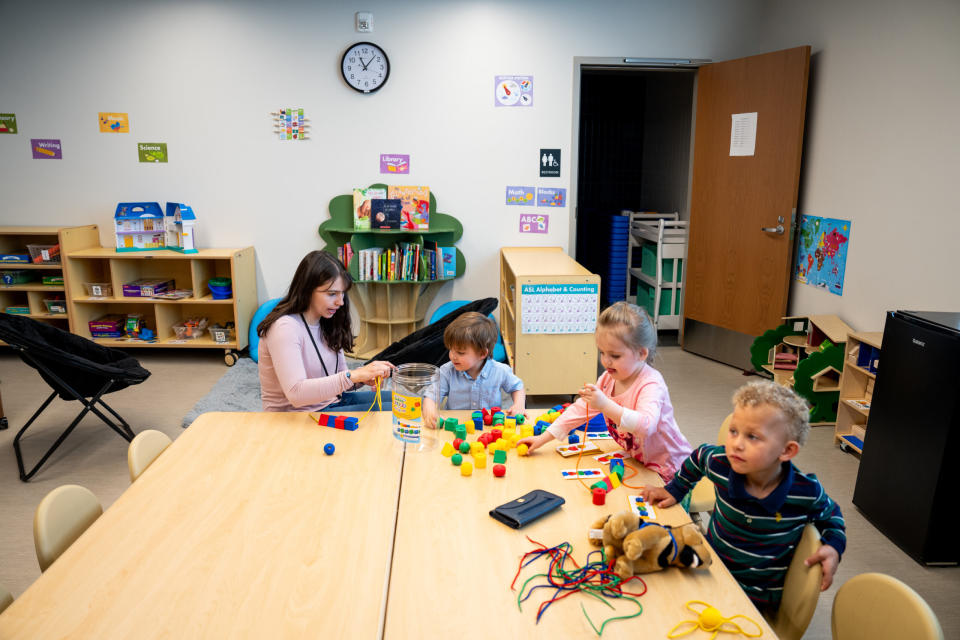
Hollowell said Switchpoint, in some cases, has left federal dollars on the table because it doesn’t classify itself as a “low barrier” provider. She said Switchpoint fills its funding gaps with donations or revenue from the “micro-enterprise” businesses.
“The move to go to ‘zero barrier’ or ‘low barrier,’ where anything goes, is something that I won’t do,” she said. “If we can’t hold people’s behavior and safety accountable, then it’s not safe for my staff, it’s not safe for my clients. So I’m going to have some rules, and I’m going to have some accountability, which means all of a sudden I’m a ‘medium barrier’ or a ‘high barrier’ shelter.”
To Hollowell, federal “funding handcuffs” and its “low barrier” requirement is “why our system is so broken. We should not have to keep programs open that are not working simply because we’re so afraid of funding cuts.”
She applauded the governor’s sentiment around holding homeless providers accountable and requiring them to show results. It’s something Switchpoint already seeks to do, she says.
Switchpoint posts annual reports on its website reporting its donations and progress. In 2023, the provider said it provided services to 8,485 people statewide. Some of those included:
1,426 people housed in emergency shelters
574 families given housing assistance support through case management
430 Utahns permanently housed in Switchpoint housing facilities
220 children served in child care
139 previously unemployed people who re-entered the workforce
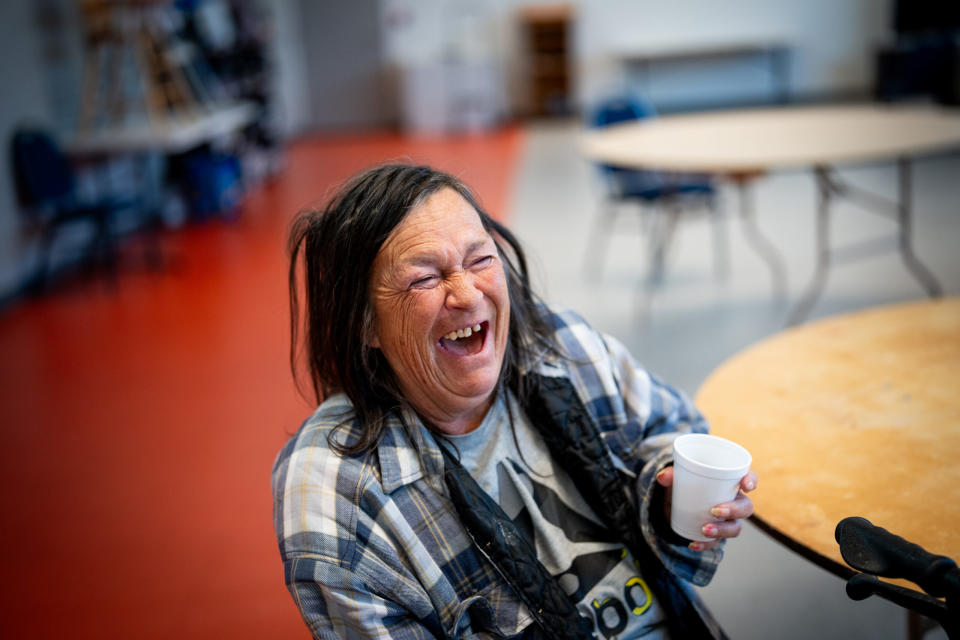
A model for other cities?
To the governor’s comments applauding Harris Community Village as a model that should be replicated in other cities, Hollowell agreed a campus with shelter and housing — along with on-site case management and other supportive services — is something that could and should be replicated in other communities.
“It doesn’t have to be a school,” she said. “It could be any kind of empty building. If you look at how much empty space there is from empty malls, office spaces, warehouses, it could be any kind of empty space that could be converted into a great campus.”
It’s something every city “that has a homeless problem or a lack of affordable housing” should consider, she said.
In recent years, Salt Lake City Mayor Erin Mendenhall and now state leaders have been issuing a call to other cities across Utah to play a part in helping solve homelessness, urging leaders on and off the Wasatch Front to acknowledge its a “statewide” problem, and not one that lands solely on the shoulders of Utah’s capital city.
For Harris Community Village, Hollowell credited Tooele and people like Pastor Rick for recognizing a problem and being part of the solution.
“It was much more open-armed,” she said when recalling Tooele’s eagerness to welcome Switchpoint. “It was, ‘please, please, come and do what you can do.’”
Even though Switchpoint has its rules, the residents at Harris Community Village were only complimentary of the provider and its staff.
Alex Pinkney, 29, who was living at the men’s dorm at the campus’ shelter, told Utah News Dispatch he was in and out of behavioral health hospitals before coming to Switchpoint. He said he’s been living on and off the streets ever since he was about 14 years old, struggling with his mental health.
He said Switchpoint’s Tooele shelter fosters a “good environment. People are nice. The staff definitely care. You can tell.”
“It’s definitely a needed blessing for me, for sure,” he said. “Just to have people that care around you. It feels nice. People that are supportive. They keep you pushing forward.”
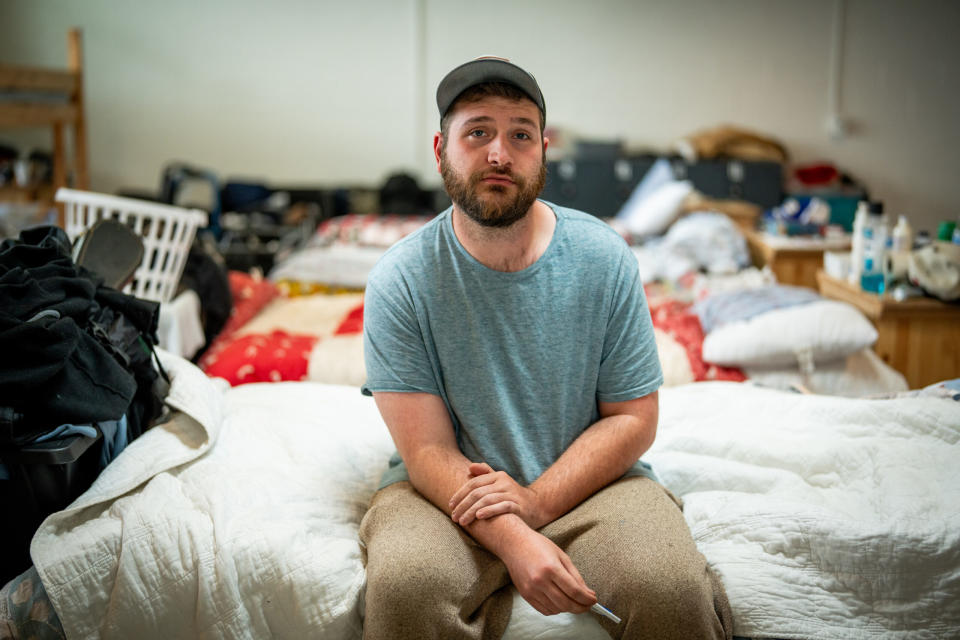
Correction: An earlier version incorrectly stated Switchpoint owns the homeless shelter in Harris Community Village. The Tooele County Housing Authority owns the entire property, while Switchpoint provides case management and resident support in the facilities.
The post Inside the old school that’s now housing Utah’s homeless: Should more cities do the same? appeared first on Utah News Dispatch.

